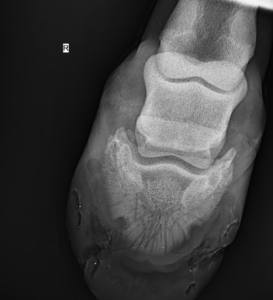Tag: demierre
Back From The Brink
Dr. Santiago Demierre Gives Peachy a Second Chance
When two-year-old Quarter Horse filly Peachy decided to jump out of her paddock for a night-time stroll this past November, she got herself into some creative “young horse” trouble. After tipping over a garbage can containing bailing wire, she became entangled in the wire and her attempts to kick free resulted in the wire penetrating the wall of her right hind hoof and looped through the sole. The more the filly kicked, the deeper the wire went until it pierced the opposite side of the hoof wall and protruded out the other side.
The first call owner Corey Chilcutt made was to the clinic, and on-call veterinarian Dr. Santiago Demierre responded immediately.
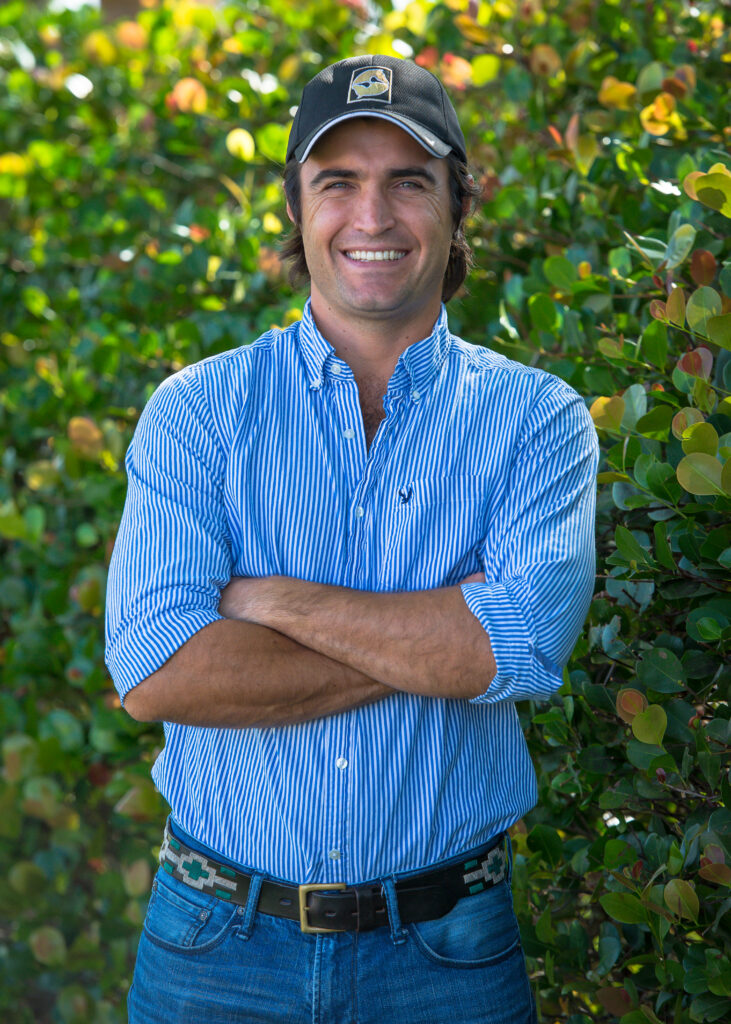
Not So Peachy Anymore
“When I arrived, the two ends of wire that looped over the horse’s back had been cut down so it was only the wire penetrating the hoof,” said Dr. Demierre. “She was stressed and in a great deal of pain. I sedated the horse and blocked the foot so she would not feel any more pain.”
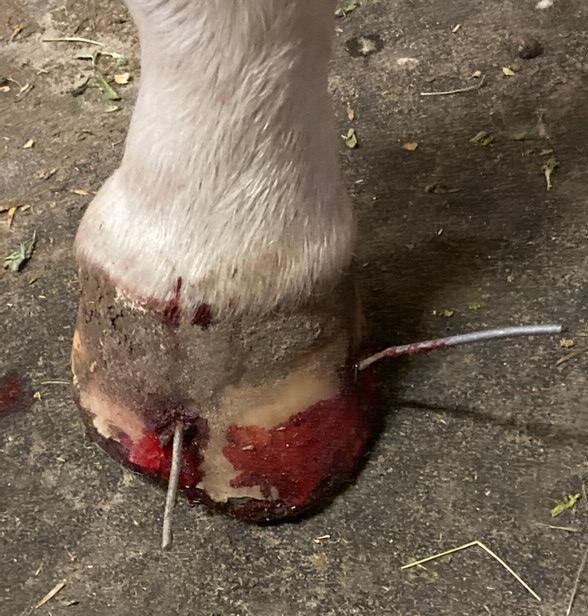
Once Peachy, who is in training to run barrels in Loxahatchee, FL, was comfortable, Dr. Demierre utilized portable radiograph technology to obtain x-ray images of the right hind foot and evaluate the injury. The images revealed that it was safe to remove the wire, and after disinfecting the area, Dr. Demierre removed the wire through the injury site.
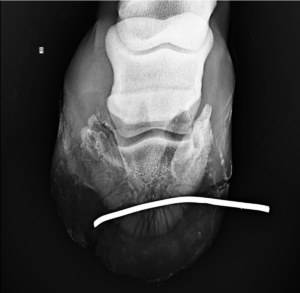
“There were no fractures or synovial structures involved, but I did see on the radiograph that the coffin bone was compromised,” said Dr. Demierre. “There was a suspicious line through the coffin bone that could have led to chronic lameness, so the prognosis for performance was reserved. The prognosis for survival was very positive, and I told the owner there was a 50/50 chance she would return to training.”
Once Peachy’s hoof was free from the wire, Dr. Demierre soaked the foot in disinfectant, and began an aggressive course of antibiotic treatments, including regional distal limb perfusion and systemic antibiotics. Finally, the foot was wrapped while the treatments did their work.
Dr. Demierre returned to check on Peachy and continue the antibiotic treatments six times over the past two months. “I performed recheck radiographs of the hoof a month after the injury and there was no fracture where we saw the initial line that caused concern,” said Dr. Demierre. “The margins of the coffin bone had reabsorbed slightly, but overall the injury was healing well.”
Once the bandages were removed, Dr. Demierre worked with Chillcutt’s farrier, Juan Rivera, on a therapeutic shoeing plan. Rivera used a hospital plate with disinfectant on the injured hoof, and a bar shoe with a pour-in pad on the opposite hind hoof. At the first shoeing reset a month later, he transitioned the right hoof to a bar shoe with a pour-in pad.
Peachy’s recovery plan included stall rest until Dr. Demierre gave the green light for hand walking six weeks after the injury. At eight weeks, she was trotting on a lunge line, and earlier this month Peachy’s rider Kloey sat on her for the first time.
“The outcome was excellent,” said Dr. Demierre. “She is perfectly sound with no medication and will be back in normal shoes by the end of this month.”
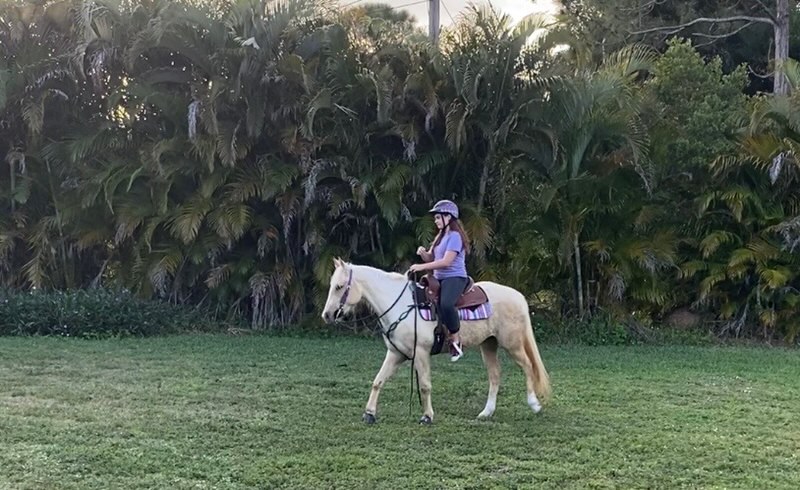
Photo courtesy of Corey Chillcutt
Chillcutt is hopeful that Peachy and Kloey will return to their training and will be running barrels in the future. “Dr. Demierre was amazing; his treatment plan was successful and Peachy was back to work much quicker than we ever thought. Words can’t describe the gratitude we have for Dr. Demierre, his technician Emma Sexton, and everyone at the clinic. Their dedication has been phenomenal.”
As of February 14, Peachy is back to her old self, according to Chillcutt, who noted, “She is happy to be back to work and she loves her job!”
At first glance, Dr. Santiago Demierre appears to be a young veterinarian making a name for himself in the field of equine medicine. A closer look, however, reveals that he is not only that but also an exceptional example of diligence; he’s also working to become an extraordinary veterinarian while speaking a second language all in a country that is 5,000 miles from his home.
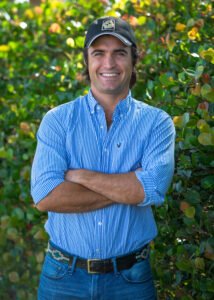
Born in San Antonio de Areco, a small town in the countryside outside Buenos Aires, Argentina, Dr. Demierre is now a 32-year-old veterinarian working with some of the most cutting-edge veterinary technology in the industry at Palm Beach Equine Clinic (PBEC) in Wellington, FL. He attended vet school at Universidad de Buenos Aires and graduated as Medico Veterinario in 2012 before setting a goal to validate his degree in the U.S. While mastering the English language, he enrolled in a certification program called the Educational Commission for Foreign Veterinary Graduates (ECFVG) through the American Veterinary Medicine Association and officially validated his degree in the U.S. in January 2017.
Today, Dr. Demierre is one of 40 veterinarians on staff at PBEC, which includes six boarded specialists and more than 80 technicians and staff members, making it one of the largest sport horse practices in the world.
Three things you may not know about Dr. Santiago Demierre:
1. Horses are in his blood.
Dr. Demierre: My father was a racehorse breeder and trainer, so while I was growing up I spent hours with him and the horses at the farm. I was always very interested in animals in general, not only horses, so even as a little kid I had the idea and the dream that I would be a veterinarian in order to be able to spend as much time with animals as I could. Now, I enjoy so many things about this work, but what really motivates me is the satisfaction I feel when I have a successful outcome on a case.
2. When the opportunity came to study veterinary medicine, he picked up and moved across the world.
Dr. Demierre: A fellow veterinarian who is a friend of mine, Dr. Eduardo Beccar Varela, contacted me with his nephew Dr. Axel Beccar Varela, who is a board-certified surgeon, and they offered me an externship at the clinic where he was practicing in Florida. I took that opportunity and began working in the U.S.
While here, a friend of mine, Gringo Colombres, introduced me to Dr. Scott Swerdlin, president of PBEC. He offered me an internship at PBEC in Wellington and I am now in my fourth season there.
The team at Palm Beach Equine Clinic is made up of great veterinarians and now great friends. There is always somebody from whom you can learn something new every day. Also, it is awesome to be in contact with the world’s top equine athletes. That is what I enjoy most about being part of the team at PBEC—working on performance horse cases. More specifically, I really like preventing and treating lameness in sport horses.
3. True to his Argentinian roots, he does some riding himself.
Dr. Demierre: I love being outdoors. When I am not treating patients or at the clinic, you can probably find me riding polo ponies. If I’m not there, I am either fishing, hunting, or enjoying some time off with my girlfriend.
Even after treating patients in both Argentina and North America, Dr. Demierre’s trans-continental bucket list is far from fulfilled. Next, he hopes to take the skills he has mastered at PBEC and validate his degree in Europe as well.
Want to learn more about the veterinarians of PBEC and what they have to offer your equine athlete or backyard companion horse? Call the clinic today at 561-793-1599 to learn more.
